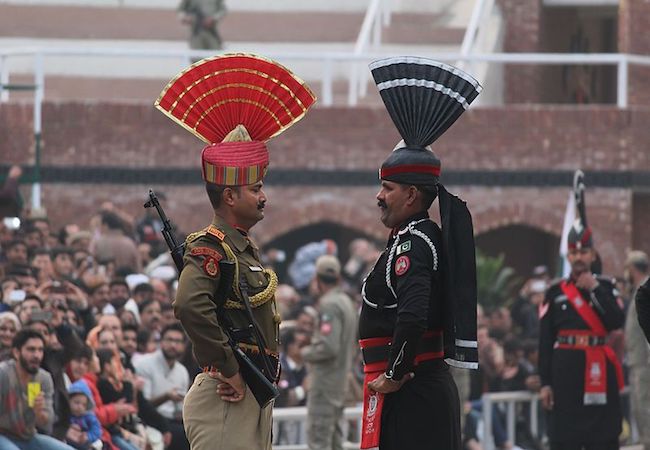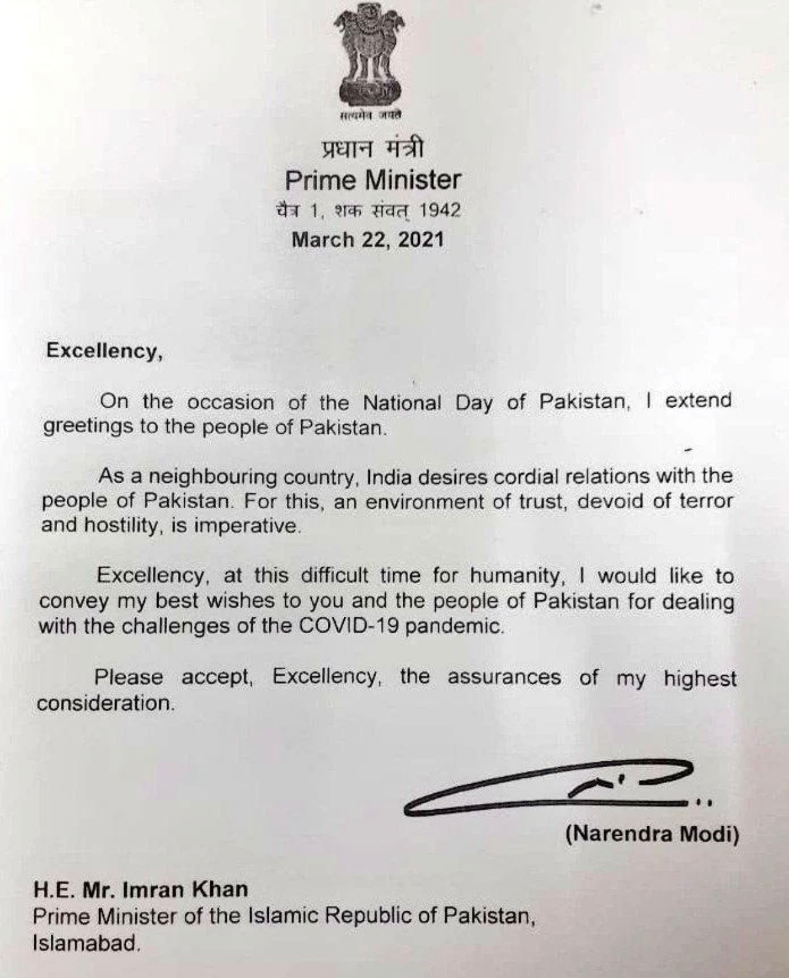Decoding Prime Minister Modi’s letter to Prime Minister of Pakistan

By Dr. Subhan Ullah
Finally, the good news is coming from South Asia. The two-arch-rival nuclear armed nations, India and Pakistan have indicated they’re willing to engage with each other. In February 2021, the Director General of Military Operations (DGMOs) of both countries issued a joint statement to recommit themselves to the 2003 ceasefire arrangements — a big sign of relief for residents across the Line of Control, a de-facto border between Indian-administered and Pakistan-administered Kashmir. A few days before the DGMOs joint statement, Pakistan Army Chief General Bajwa mentioned in his speech that: “It is time to extend the hand of peace in all directions”. This peace gesture from Pakistani Military brass could be perceived as Pakistan’s willingness to re-engage with India.
Situation between the two countries went to an extremely low point following the Pulwama terror incident in Indian-held Kashmir, resulting India to retaliate, and having air strikes on Balakot – a territory deep inside the Khyber Pakhtunkhwa province of Pakistan. The next day, the crisis further escalated when Pakistani fighter jets attempted to reciprocate, resulting in a brief aerial skirmish between the two powerful air forces.
The tit-for-tat diplomacy between India-Pakistan is inherently ineffective. Dialogue and the peace process between the two countries is the way forward for long-lasting peace in South Asia. India has also shown interest in reviving the peace process, and Prime Minister Modi has recently sent his best wishes to Pakistani counterpart, after Imran Khan was tested positive for Covid-19.
Best wishes to Prime Minister @ImranKhanPTI for a speedy recovery from COVID-19.
— Narendra Modi (@narendramodi) March 20, 2021

Two days later, Modi wrote a greeting letter to his Pakistani counterpart indicating ‘India desires cordial relations with the people of Pakistan’. There are rumours that a country in the Middle East (probably UAE, or Saudi Arabia) is playing a crucial role in brokering peace talks between India, Pakistan. Representatives of both countries have attempted to score points against each other in various international fora (UN General Assembly, UN Human Rights Council, etc). Backchannel diplomacy in such hostile situation could potentially be the only way forward to satisfy the domestic audiences in both countries. Emotions and politics need to be set aside when assessing the relationship between these two countries. However, this new peace process is indeed highly fragile and can potentially be derailed by non-state actors in both countries.
Looking at the content of the letter ‘An environment of trust, devoid of terror and hostility’ seems to be preconditions for the resumption of peace talks. Historically, the BJP led government in India had a tough stance that ‘Terror and talks cannot go together’, an accusation which Islamabad continuously denies. The changing global political landscape in a post-Covid world requires increasing regional cooperation. One may agree or disagree, but, as a matter of fact, India has demonstrated its global leadership by developing and distributing Covid vaccines, and the ‘vaccine diplomacy’ has so far proven very effective in favour of India.Pakistan, on the other hand is playing an impressive role in mediating the Afghan peace process and a stable Afghanistan would no doubt bring stability to the entire region. A stable Afghanistan would change the socio-economic dynamics of the entire region, and both Pakistan and India are likely to benefit by securing a greater share in the Afghan business market. A long-lasting peace agreement between India and Pakistan would potentially provide direct road access to Afghanistan via Pakistan. India can also use Pakistan’s geographical proximity in accessing the Central Asian markets, via Afghanistan. Currently India is aiming to utilise Iran’s Chabahar port in getting an alternative access to the Central Asian countries — a route that is lengthy and costly. The direct supply chain access through Pakistan can substantially reduce the time and costs for Indian investors. As an example, one can imagine a vehicle carrying fruits and vegetables departs from Amritsar (India) in the early morning, and arriving at Jalalabad (Afghanistan) in the evening, and vice versa — an opportunity which is much needed for India, if it has a continuing desire to compete with the global dominance of China.
It is indeed premature to start developing too many expectations. Media houses in both countries have started constructing their own national narratives of the peace initiative. As usual, several questions and queries are debated in national media outlets in both countries. The common unanswered questions are: Is this peace process being long-lasting? Would there be a permanent way out to resolve the outstanding disputes, including Kashmir? Is the local Kashmiri leadership taken on board in the ongoing peace process? Would there be any dementalization in the Kashmir region? Whether India will restore the autonomy and special status of Jammu and Kashmir? Will there be a resumption of secretary-level talks between the two nations? Are these two countries going to reinstate their high commissioners in their respective embassies? Would there be a resumption of cricket matches? Would the two countries restore trade and commerce activities? Would there be a temporary suspension of blame game rhetoric? Who is supporting the mediation process? What would happen to these talks if there is an unfortunate Pulwama type incident? There is a long list of questions and speculations to generate. There is a long way down the road to get some of these questions answered in months and years to come. The whole world will be watching and expecting some tangible outcomes.
On a positive note, it is expected that more surprises are likely to emerge from Indo-Pak negotiations. There are speculations that Prime Minister Modi may potentially visit Pakistan to attend the pending South Asian Association for Regional Cooperation (SAARC) summit in Pakistan. Until then, we can wait and see, and, celebrate the peace gestures from both countries.
Dr Subhan Ullah is Associate Professor at the University of Nottingham, UK




